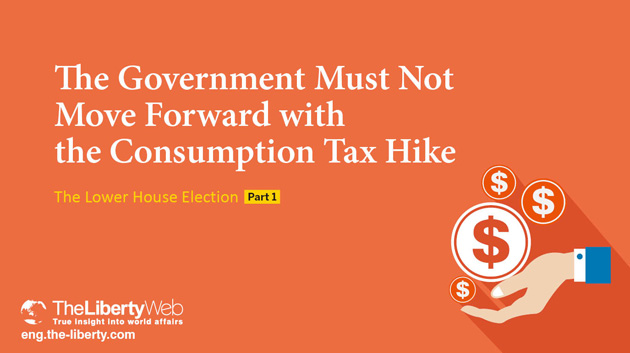The Government Must Not Move Forward with the Consumption Tax Hike
The Lower House Election (Part 1)
Why is a rise in consumption tax a bad idea?
The simple answer to the question is as follows; “The consumption tax is a hurdle that puts downward pressure on economic activities. An increase in the consumption tax rate will hurt the Japanese economy.”
Prime Minister Shinzo Abe expressed his decision to postpone a hike in the consumption tax to 10 percent by 18 months, but he also said that he will surely push through a tax hike to 10 percent in April of 2017, which is a terrible policy because he is promising to increase the tax rate regardless of the economic assessments.
The Japanese economy was already hit with a 3-percentage-point hike from 5 percent in April.
When the Consumption Tax Went up to 8 Percent, It Seriously Hit the Japanese Economy Harder Than the Great East Japan Earthquake Did
You often hear the word “Gross Domestic Product (GDP)” in the news. It’s used to measure the economic performance of a whole country or region. Due to the April increase in the consumption tax rate from 5 to 8 percent, the real GDP in the April-June quarter fell 7.3 percent on an annualized basis, which triggered a bigger economic contraction than the Great East Japan Earthquake did.
Why has the hike in consumption tax had such a negative impact on the economy?
Consumption Tax Is a Hurdle That Obstructs the Economic Activities.
Comparing the economic activities that involve the buying and selling of goods and services to people who run on a 400 meter track, the consumption tax could be described as a hurdle. If you were to raise the hurdle of a tax rate higher and higher from 3 to 5 percent, and then from 8 to 10 percent, people would begin to get tired, and they’d run at a slower pace.
Furthermore, the consumption tax applies to products or materials at several stages of their lifespans, for example, their manufacturing stages, distribution times, and purchase points. The tax slows down the velocity of the circulation of money and goods, and then it stalls consumer spending, which leads to economic downturns.
The Liberal Democratic Party (LDP) believes that a consumption tax hike should go together with economic growth, but you can never have it both ways. A boost in the tax rate will definitely destroy the Japanese economy.
What Is the Difference between the Consumption Tax in Japan and in the West?
Some of you may say, “The consumption tax is higher in Europe and in the United States than it is in Japan. Why is that so?”
The LDP often insists that Japan should further raise its consumption tax rate because the current 8 percent rate is relatively low compared to the 20 percent rate in Britain or the 25 percent rate in Sweden and Iceland.
However, don’t let the numbers easily fool you. European countries and the U.S. have introduced reduced tax rates on daily necessities and other items. For example, commodities such as groceries, newspapers, magazines, and medical products are allowed reduced tax rates.
Furthermore, the West and Japan think quite differently about consumption tax. In the West, they call it value added tax (VAD), and people are accustomed to higher tax rates. Besides, they understand that consumption helps improve the economy. In other words, they know that their lifestyles are based on consumption.
On the contrary, Japanese people have always had the tendency to think that saving money is a virtue while spending money is not good because it leads to extravagance or splurging. Japanese prefer a saving-oriented lifestyle. If politicians hike the consumption tax without changing this kind of thinking, which is based on Japan’s national character, it would have a hugely negative impact on Japan’s economy unlike the effect it had in the West.
Since its founding in the Spring of 2009, the Happiness Realization Party (HRP) has constantly maintained its stance against hikes in the consumption tax, and it has championed tax cut policies. In the campaign for the upcoming Lower House Elections, HRP promised in its campaign platform to reduce the consumption tax rate to 5 percent in order to bring about an economic recovery and to create economic growth in Japan.
A large tax cut and the easing of regulations is very much key to getting the Japanese economy back on track for growth.



















